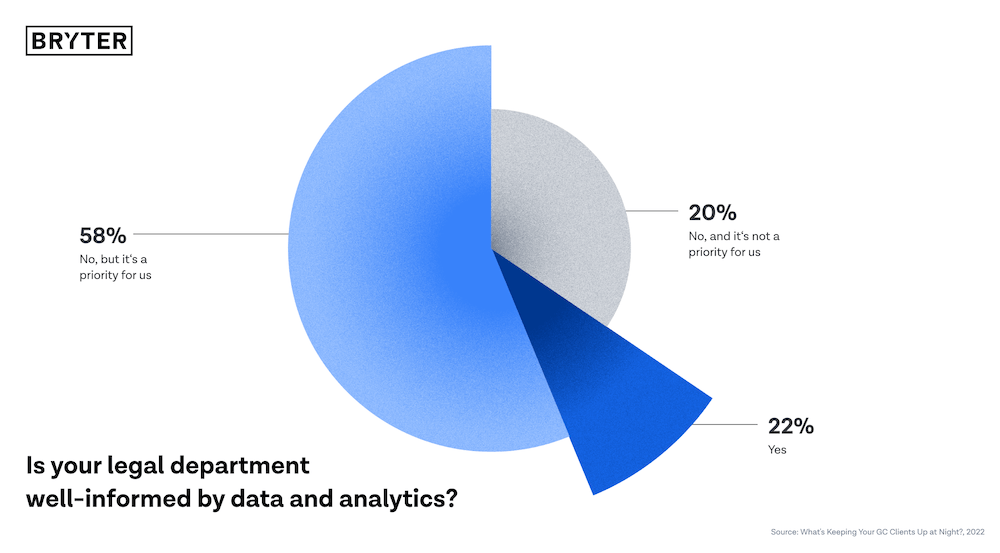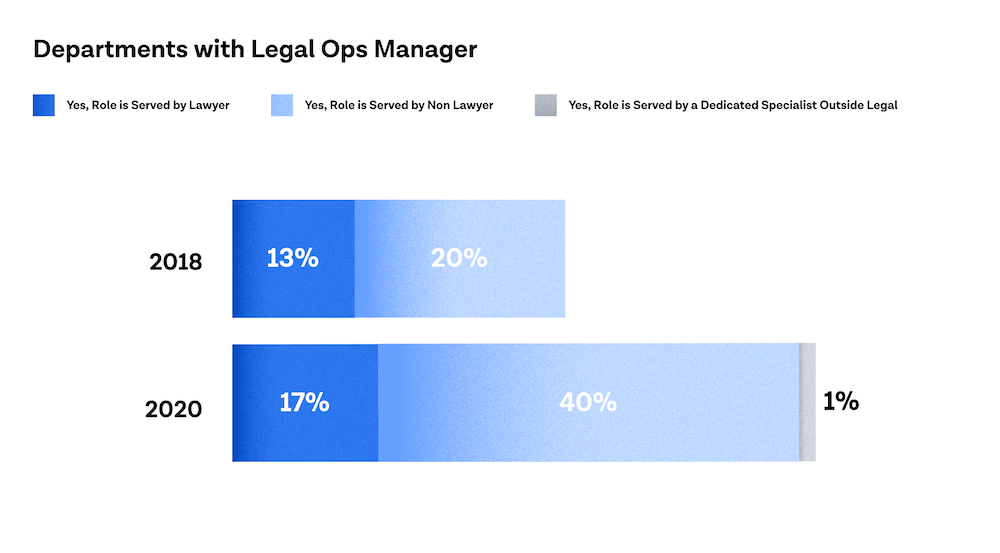
By Michael Grupp, CEO, BRYTER.
Around the world, companies are experiencing “process digitization fever” — everything faster, easier, better, and at a fraction of the cost.
It seems the legal world is on board with this movement too, judging by the turnout at conferences like CLOC, ILTACON, and the Alternative In-House Technology Summit. But speaking to GCs around the world, I am not so sure.
Frankly, the legal world lags behind, lacking meaningful business metrics, experience in digital transformation projects, and adequate budget. And change requires exactly those things: data, skills, and money. If we are not making an effort to digitize, we are truly becoming the “Department of No” in a workflow-happy world, analog outliers blocking business processes. And with that, comes the risk of losing our seat at the boardroom table.
It’s time that legal teams learn to embrace measurable value creation before it’s too late — and before they lose control of the future of their own function.
What do the top GCs say about digitization?
At the last Alternative In-House Technology Summit, one question stumped a panel that had just complained about low software budgets: “If you don’t get budget for software in your own departments, what say do you have in shaping the company’s digital processes?” The GCs — all from large companies — could only remain silent.
Are lawyers left out in the digitization of their own services? The senior counsel of a major German project developer admitted at the Bucerius autumn conference in Hamburg: “We are no longer involved in some real estate projects.” Why? The company has learned that it saves costs by using standard templates and clauses that are digitally stored in the project management software along with simple rules. They have decided not to involve their legal advisors, who delay the project flow “without measurably increasing value.” And what about the risk? The savings far outweigh the cost of fixing problems later, the counsel shrugs. “And project managers now have more data on essential contractual clauses than we do ourselves.”
So these project managers don’t have legal expertise, but they are seizing control of legal processes nonetheless. Why? Because they have data and legal doesn’t. They can measure value where legal can’t, and they provide data-driven insights and recommendations that legal can’t answer with its own data. And this is just one example of a broader trend.
When data is king, and everyone but legal has it, legal loses. And if legal is pushed out of the boardroom, while companies might realize short-term savings, they too will lose in the long run. And this is not just a European issue. This year at TechGC in New York and at ILTACON near Washington D.C., panel discussions focusing on “KPIs for the legal department” took an unexpected turn: While the audience – and moderators – had their notepads out to take home useful success metrics, the panelists were unanimous: “We don’t really measure.”
This gap between a desire to be measurable and a lack of measuring was reinforced in our recent survey of GCs from across the Fortune 500. Most say that becoming data-informed was a priority for them, but that they currently lack meaningful data and analytics.

To see more about what they said, you can download our full report, What’s Keeping GCs Up at Night?
The digitization party is already happening. Did legal miss the invite?
While the corporate world is busy digitizing end-to-end, lawyers are still busy keeping up with day-to-day legal requests. In many companies, the law department has a reputation for being highly manual by necessity and a bottleneck to business processes. Legal usually isn’t number one on the invite list when it comes to digitization strategy sessions, and if they’re invited at all, they certainly aren’t leading the pack.
And this is partly for good reason — because legal traditionally has very little IT budget, they also have little IT project experience. With that lack of experience, more problems surface in the wake of the great digitization: lack of the much-needed integration into company processes, no basis for process standardization, and above all, a lack of measurability. To maintain influence in an increasingly digital world, the law department must figure out a way to surmount these challenges, measure their value, and prove it against business objectives.
Struggling to scale and evolve at the same time
The legal department has long been considered a “trusted advisor,” to the business. Their predominant task is to advise on complex, highly individualized matters and to provide decisions on a case-by-case basis. But standardization and digitization are changing the landscape of the legal profession significantly: the client is no longer just the board of directors, but (tens of) thousands of employees who need information, decisions, and documents — anytime, anywhere.
For legal teams, this situation is a balancing act. The complexity and density of regulations are increasing in many areas, and legal must act as advisors more than ever, and be involved in decisions at an early stage. At the same time, larger and more agile organizations require legal to act as a 24/7 service center that operates as quickly and efficiently as other departments in the organization. The increased speed at which these departments now operate as a result of digitization leads to even more requests for legal and compliance — the so-called “Departments of ‘No'” — exacerbating an operational divide and perpetuating their reputations as bottlenecks to scaling.
The fact is that scaling – the main goal of the company – needs to no longer be seen as a problem for the legal department, but rather a known responsibility, and an opportunity for legal to have a specific, measurable impact on the company’s goals. Investing precious time and money in new initiatives can be daunting — or might even seem impossible — in the face of a packed slate of day-to-day work, but the reality is that evolution is necessary for the current business climate.
The chicken-egg paradox of procuring legal tech budget
The technology is available to solve the problems outlined above, but the budgets are lacking. While other departments allocate double-digit percentages of their costs for software, the ration of IT budgets in legal departments sits just below 4% (Gartner, State of the Legal Function, 2021).
Even tech-forward heads of legal departments are often disillusioned when they realize that they can procure budget for external consultants, but are slowed down when it comes to digital projects. Decision-makers ask tough critical questions about the estimated ROI of the software and the anticipated measurable impact. Suddenly, legal teams are faced with measuring and assigning value to their work, which paradoxically, they often can’t do without specialized technology.
Legal must be allowed to experience — and learn from — mistakes with software
Even with approved budgets, hurdles remain. At the annual conference of the Corporate Legal Operations Consortium (CLOC) in Las Vegas in May, a speaker asked the crowd, “If you have already purchased a contract lifecycle management system, please stand up.” Around half of the participants stood. “And please keep standing if you have successfully rolled it out in the company.” The crowd was almost completely seated again. But this is not unusual – IT projects are complicated, especially where they require significant rollout and change management.
McKinsey reports that as much as 70% of digital projects fail to meet expectations. This has left many companies skeptical of specialized software, especially in the legal and compliance fields, where new software is relatively unprecedented, and risk is to be avoided at all costs. This presents another opportunity for us to evolve, because to meet this moment, we must embrace failure as a process and get acquainted with complex projects. For this journey, I offer you Greg Lemond’s advice: “It will never be easier, you just go faster.”
The bottom line: Legal must embrace these challenges
Talking the talk of digitization is an important step, but when the business is walking — or running — away with it, legal risks getting left behind.
The only way legal can avoid being pushed out of the boardroom is by addressing these challenges head-on, embracing the possibility of failure, and pushing towards digitization. And these efforts must begin with and be constantly fueled by data — wherever it’s available.
Digital processes generate data that can be a strategic justification for significant investments and proof of a real increase in value, especially when dealing with dashboard-loving businesses. This is perhaps best demonstrated by the increasingly common fixture of legal operations functions within corporate legal.

Data is not primarily about the transparency of one’s own workload, but about optimizing processes for internal clients. Data shows the relevance and value of legal services, how they are consumed, and above all, what influence they have on the metrics of the specialist departments. In short, clear data shows how law creates value for the business – be it when concluding contracts with customers, in purchasing, or in licensing processes.
For the first time, even simple self-service applications for legal intake give the company’s lawyers visibility into the type and frequency of the requests they receive. Interactions with these applications are tracked automatically, and embedded into broader business processes, making it transparent how legal is a value-creator, and helping them to positively influence the rest of the business.
This is where the greatest lever of digital transformation lies for lawyers: Their advice is not only scalable, but measurable, in a positive sense. And that is why those responsible for the company’s success are increasingly focused on digitizing and integrating legal decisions — even without legal’s input, if necessary.
So with that, I invite you to embrace the challenges of digitization. We need to go past discussions of the topic as a marketing buzzword, but rather take up our path to meeting the demands of the modern business. And most importantly — it’s already happening, with no signs of slowing, with or without legal. Still, legal is as crucial to a business’s success as it always has been. Now is the time to demonstrate our value, lead in digitization ourselves, and create our own future.
—
About the author: Michael Grupp

Michael is the Co-Founder & CEO of BRYTER, the leading no-code legal automation platform. BRYTER enables expert teams in law and compliance to build, manage and distribute powerful applications quickly and reliably.
Click here to learn more about BRYTER, book a demo, or start a free trial and see for yourself why businesses that run on BRYTER love their legal teams.
[ Artificial Lawyer is proud to bring you this sponsored thought leadership article by BRYTER. ]